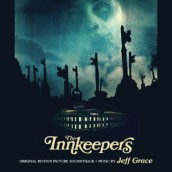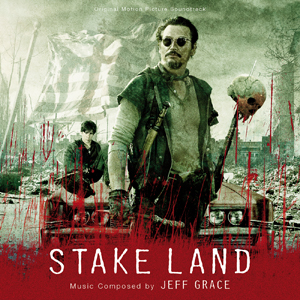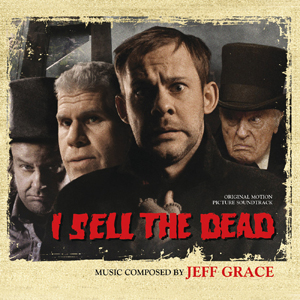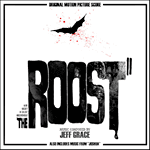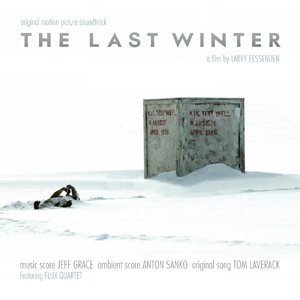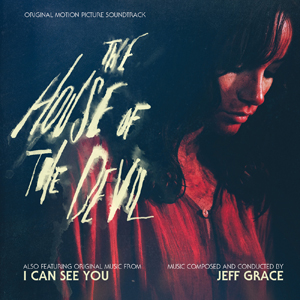Any horror-centric composer can enter a haunted house and awake the resident spooks by throwing a battery of percussion instruments and equally unsubtle samples down the steps of a dark basement. But it’s one thing to rattle the nerves, and another to truly frighten the listener. With subtlety, and melody becoming many since-deceased composers like Bernard Herrmann and Jerry Goldsmith, a young musical Turk named Jeff Grace is successively scaring the hell out of us with more of a whisper than a scream, even if he might not have his predecessor’s orchestral resources. It’s a similar high-quality, low budget appeal that marks the work of frequent filmmaking collaborators Ti West and producer Larry Fessenden. Their pictures like THE LAST WINTER and HOUSE OF THE DEVIL keep their audiences waiting a good long time before delivering the carnage, with minimal blood and effects at that. For these are intelligent fans of the genre whose stylishly brooding work is all about atmosphere, i.e. the long shots of people walking around places they shouldn’t before a monster vaguely pokes about the corner. What makes Grace’s scores for them so unique is that it isn’t about padding the stalk before the slash. Whether he’s using eerily drawn violins, voices or a surfeit of thematic melody, Grace has proven himself to be a horror composer with meat on his bones.
Even when the horror is more evident, or quirky in the likes of THE ROOST, I SELL THE DEAD and STAKE LAND, Jeff Grace’s approach always proves interesting, whether he’s employing the shriekingly impressionistic strings of rabid bats, Baroque bemusement or channeling a vampire apocalypse that Carl Orff might have written by way of an unbalanced Woody Guthrie. Now for his trip inside THE INNKEEPERS’ haunted New England hotel, Grace brings a welcome battery of classic horror stylings, from the melancholy theme to the ghostly wailing and a piano that you can imagine playing by itself.
It’s all part and parcel of Ti West’s most direct shot at taking his arthouse approach to horror into the mainstream, an effort that’s gotten his best critical responses yet. And if punk fans drenched in blood and brutality might think THE INNKEEPERS’ humorous, yet thankfully uncondescending approach as positively antiquated (if still barely R-rated), admirers of such classic chillers as “The Uninvited” will be made positively giddy by the film and Grace’s accomplished score for it. Not only is his INNKEEPERS music actually fun, but it revives the biggest ghosts of all- that of an unabashedly harmonious, and grandly thematic horror score with enough crazy stuff to get you jumping at the creak of a door- a point at which the laughs have long since turned into a vibe of pure, old school fear.
ASSIGNMENT X: How did getting your start with Howard Shore influence your own work as a composer?
JEFF GRACE: There is a big demystification that happens when you get behind the curtain of a composer like Howard. Seeing just exactly what goes into getting scores for bigger films done was revealing. Who are the different people involved, what do they do, what’s the process, both daily and over the course of a project. How do you come up with a schedule, a budget, what works well in larger recording sessions, how do you communicate with different directors. Seeing someone’s process at that level of the game was helpful, as well as seeing just how much work and how much of a sustained effort goes into things. Just being exposed to all sorts of stuff I wouldn’t have seen otherwise.
I also got to meet a lot of other composers and their assistants, which was helpful. You start to pick up how different composers might approach things, which ultimately helps when it’s your turn to figure out what works for you. There were other people too, like Paul Broucek. He was head of music at New Line when we were doing LORD OF THE RINGS, and he is just an awesome guy. One of many excellent pieces of advice he gave me was, “Don’t try to be John Williams or Howard Shore. They’re already there and there are tons of people more established than you waiting to take over when they’re not available. You also won’t have the resources and budgets they get for a long time, if ever. So, learn to be creative with what is accessible to you. Find a voice for yourself there and people will take notice.” That’s some of the best advice I’ve ever gotten.
As far as a composing goes, I think one of Howard’s real strengths is his writing for dialogue. It’s very important, and often times difficult to do well. It’s interesting to see someone like John Williams’ approach – he manages to be so active under dialogue sometimes. And I think the way he makes that work is by not actually changing up too much once he’s got something going. He keeps fairly consistent with that activity and there aren’t a lot of big curves, so his music doesn’t end up disrupting and attracting too much attention to itself. Howard’s approach is a lot more sensitive and tends to contour to the scene more delicately. It’s more sparse or intimate, and often times that becomes more introspective. They’re very different composers who accomplish very different things, yet both Howard and John’s work is masterful.
AX: Your first feature (and movie with Ti) THE ROOST features a literally batshit score, and still is probably your most frenzied work to date. What was it like to make your debut with such a frenzied score?
GRACE: That, in part, goes back to what Paul was saying, plus the collision of a few different elements. I had a small budget, but a budget enough to hire a handful of musicians and do two days in the studio. I personally love a lot of modern music and have some musician friends who are well established in New York for that type of music (cellist Dave Eggar and violinist Tom Chiu). And I came up in the school of “The better you write for small ensembles, the better your larger writing and orchestration will be,” so THE ROOST seemed like a really interesting challenge.
Ti wanted something that could create a mood and suspense and then deal with heavy action, so strings just offered a wider variety of sounds. I thought it would be really fun to try it with a really edgy string quartet and percussion – it became pretty obvious that this approach meant getting a big sound out of a quartet. Ti was really into it. We did the first day of recording and the players were way better than I ever thought. We had a week or two before the second session, so I amped it up more for that session and we all just had a lot of fun with it. That also sort of set the stage for my relationship with Ti. He always wants to push the envelope and try something new for us. He’s willing to take the risk.
AX: Could you talk about evoking the haunted great white north in THE LAST WINTER?
GRACE: Larry Fessenden, the director, had these recordings of whales in part of the movie and I thought we could do that with weird string harmonic stuff and some delay. That started a whole conversation of using acoustic instruments to come up with more abstract sounds to play into the tundra and the characters’ paranoia. Bass ocarina for the sound of wind. The microtonal material for the strings to deal with their mental states. Aggressive brass for the wrath of nature or, really, nature fighting back. Then Larry was really interested in expressing a sense of loss. Humanity signing its own death warrant through arrogance and disregard for nature. That’s where the more lyrical material comes in. Larry is an extremely thoughtful filmmaker and he’s a big fan of music – he knows a lot of different music. So, we always have great and fun conversations when we work together. There is a lot of discussion about story telling and the characters.
AX: I SELL THE DEAD is a deliciously absurd satire on the Burke and Hare legend, and the first score where you really got to let your hair down and have fun. Did you welcome that opportunity?
GRACE: Absolutely! I feel very fortunate in that I’ve had excellent collaborators, and a lot of them are really interested in music and care about it a great deal. This is definitely the case with Glenn McQuaid. We shared a lot of our musical interests and Glenn lobbied hard to get things in place so we could have a bigger sounding score (producers Larry Fessenden and Peter Phok were also very supportive of the whole venture). To me, writing music for film is very much so about drawing your audience into the world of the film and its characters. And that often means doing so without attracting too much attention to the score (the worst is when the music actually pulls the audience out of the film). Glenn had just created this awesome world for his characters to inhabit and Larry and Dominic Monaghan and the rest of cast just really made it all come to life. So, there was a lot to play with there.
The challenge of that score was the sort of episodic nature of the different tales. One of the areas where I feel a score can be really helpful to a film is in unifying the film and threading things. That can get difficult the more things are compartmentalized or sectioned in terms of story. But, the characters and world itself were more than enough to chew on. It actually offered a really nice and challenging variety of material. The added resources let Glenn and I have a lot of fun with the orchestration. The whistler and getting the “Saw Lady” were Glenn’s ideas.
AX: THE HOUSE OF THE DEVIL featured a return to full-on horror for you with a spare, almost chalkboard like score from the instruments. Was it your intention to achieve a lonely, and “painful” score for a babysitter with a very dire fate ahead of her?
GRACE: Yes – it goes back to what I was saying about creating a mood to draw your audience into the world of the film. As always, Ti wanted to go for some different sounds, so we started talking about piano. I thought about it a bit and started messing with prepared piano. There’s the whole isolated element to Samantha. She’s in a weird house, in a weird situation (babysitting for a very odd family, the baby turns out to an old person), in the middle of nowhere with no one else around. There are a lot of pregnant pauses that needed to be dealt with, but that is all opportunity to create a sonic world to draw the audience into the film. And in a film like that it becomes a real balancing act. You don’t want to overstate things or have the score attract too much attention to itself, but it’s really just a person standing in a hallway or looking at a door. You don’t want to reveal too much too soon, and Ti is always cognoscente of audience expectations and keeping people guessing.
Part of the effect of the film is keeping people on their toes for an extended period of time – leading them on. Is this corner going to be the one where something finally does happen? For the long tension ramp up it really became about establishing this off-kilter sense, and I thought that strings really captured the idea of that in this case, along with that weird prepared piano stuff. And with that piano theme, Ti wanted the music to evoke a bit of a mystery. What is this story that is going to unfold? What are these weird people that are hiring Sam to baby-sit about, and why are they so odd? And when Sam starts, little by little, to realize that the stories they’ve told her don’t add up, the tension rises even more.
AX: STAKE LAND is such a terrific vampire apocalypse film because it never plays like one, especially when it comes to the score. Was it your intention to play against those expectations by writing such a rustic, and weirdly beautiful score?
GRACE: I started talking to director Jim Mickle about the score in my usual way. What do we want the world the film takes place in to feel like? And resources also give you a starting place. From the beginning Jim wanted to play to the characters more. He wanted a lonely, spare feeling to address the collapse of society, and a bit of an Americana feeling to speak to what was left in its wake. He and writer/actor Nick Dimici also talked about this sort of going back in time the farther the characters headed north and away from the remaining towns. There were obviously going to be some full-on scenes where vampires are attacking, but I figured that going for a more intimate and stripped down approach for a lot of it would get more to what Jim was talking about. The stripped down approach also meant saving more resources for the few big cues, which was really helpful. It also seemed to play better to the way “Stake Land” was shot. I do find myself being influenced by a good cinematographer, and Ryan Samual did an excellent job shooting the film.
AX: THE INNKEEPERS gives you a chance to have a lot more fun scoring horror music for director Ti West, at least at the beginning of the film. Did you welcome that opportunity to show your lighter side for him, especially in terms of the film’s comedic set-up?
GRACE: Establishing the comedic tone in the beginning of the film was pretty tough, actually. It’s not a typical approach to horror comedies where the horror and people’s reactions to it are the comedy. This is more a comedic start that goes downhill. I tried a bunch of different things. I had been resisting the ‘uhm-pa’ approach thinking it was going to be way over-the-top. It’s pretty close to the line, but it ultimately came down to coming up with a subjective sound for Claire. That material is all her experience. But, I do like different challenges and trying new things. Ti does some pretty ambitious things, but he hasn’t steered us wrong yet, so I’m always game. When he first heard the music that is in there now he said something like “Yeah, that’s bold, alright! But, I guess we’ve gone down that path.” Now, I couldn’t tell you at all what some of the other stuff I tried there was.
AX: A lot of your horror scores, and horror movies for Ti are about the deliberately paced “slow burn” where the real action doesn’t happen until the last reel or so. What kind of importance does that place on your music to build interest, and suspense when there might not be much happening onscreen, especially for THE INNKEEPERS?
GRACE: That goes back to what I was saying about THE HOUSE OF THE DEVIL. And that’s one of the reasons I like horror. There are often a lot of opportunities to create a strong mood. Horror is also a much more appropriate place for using modern classical music and extended techniques. Ti puts a lot of faith in Graham Reznick, the sound designer, and myself, because audio is a big part of filmmaking and the film viewing experience for him. It’s challenging, but really rewarding when you get it right.
AX: Do you think patience is lacking in horror scores that are balls-to-the-wall from beginning to end?
GRACE: A score can only do so much for a film. The film itself, the writing, directing, editing, acting- those really determine a huge amount of things for a composer. I think there are a lot of bad or uninteresting horror films that get made (and I would say that about films in general, not just horror films). But, I would say that patience is lacking in a lot of horror films today, more so than in the past. The scores for those films are just reflecting what their filmmakers have done. I’ve heard some really bad scores from composers I generally really like. It just makes me wonder how much the composer’s hands were tied by the director or producer, and how much time he or she had to do the score. These are huge factors.
AX: THE INNKEEPERS seems to draw on Bernard Herrmann more than your other scores. Was that a deliberate salute?
GRACE: I wasn’t thinking of it consciously at first, but it’s hard not to think of Hermann when you have the type of use of augmented chords. It’s a composer’s job to listen to and absorb a lot of music. That just comes with the territory. So, that stuff just gets in your ear over time and you also start to see what makes certain things work. Hermann would use little phrases and gestures as sort of musical modules. He would make them elliptical so they could keep repeating, or then shift and go somewhere else. When I started working on THE INNKEEPERS, it became evident that I need something that could be brief and ask a sort of a question, but also be part of something larger for bigger development. It had to be able to hold tension, or be incorporated into a theme. So, I came up with the three-chord thing (a minor, F augmented, a minor) that keeps playing and then also becomes THE INNKEEPERS theme. So I think that modular thing with that type of harmony brings Hermann to mind.
AX: How did you want your music to evoke the ghostly world that lies between the walls of the hotel, particularly in your use of voice?
GRACE: That’s a pretty conventional one. In fact, we talked about that because the voice is done so much. But, we thought this film was different than those other pictures. It’s a lot more accessible to general audiences, so we didn’t shy away from using a voice. There is also a lot of whispering voices in the sound design and we try to tie the music and sound together as much as possible. This helped with another connection between the two.
AX: Do you think there’s musical sympathy towards the ghost of the woman who haunts THE INNKEEPERS’ hotel?
GRACE: It’s all pretty much from Claire’s perspective and Claire is ultimately quite freaked out by the ghost of Madeline. At first Claire is very curious, but it turns into something a lot more fearful.
AX: THE INNKEEPERS relies equally on hushed sound effects for scares as it does your music. How did you want to make sure your work didn’t overwhelm the sounds being captured on their ghost-hunting microphones?
GRACE: Ti is pretty clear about where he does and doesn’t want music. When a scene is going to be more sound design or score. They had a definite concept to the headphone stuff so we knew that was going to be sound design (except the piano playing in the lobby). Graham and I send files back and forth as we’re going so we know how to play off of each other, or stay out of each other’s way.
AX: Do you think your work lends itself to horror films that are more classically oriented in terms of their pace, and lack of CGI effects like THE INNKEEPERS, which feels in many ways like a salute to such old-school ghost stories like THE UNINVITED.
GRACE: I personally prefer that type of film, unless the film has something extremely original to it. But, my having done more of those films comes really from the people that ask me to do them. I work a lot for Larry Fessenden’s company Glass Eye Pix. The projects coming through it are a lot more “thinking person’s” horror movies, where more attention is paid to the art of filmmaking. Because I’ve done more of these kinds of genre films, I think people have started to think of me that way.
AX: What do you think makes music scary, especially in THE INNKEEPERS?
GRACE: It’s that same old things of creating a mood that works well with the pacing. You often times pull back and push against things. Progressing that way with music can create a lot of tension.
AX: How do you think Ti has developed as a director, and your scores along with him?
GRACE: I think the scope of his films has been getting bigger. He’s also getting really strong at writing for characters and dialogue. THE INNKEEPERS is our biggest film to date in terms of scope and I think the score reflects that. We’re widening our net.
AX: While you’ve scored your share of dramas like TRIGGER MAN and MEEK’S CUTOFF, you’re now primarily known as a “horror” composer. Do you welcome that label?
GRACE: I love doing good horror films, I just don’t like it when people think that horror is all I do. To me, things are about interesting projects and good collaborators. I consider myself a composer who happens to have done a good amount of horror films, but not a horror composer, per se. I don’t even consider myself a “film composer”, really. I’m just a composer who works in film a good amount. I do other things as well, and I think that’s important for keeping things fresh. We’re composers first – musicians who work in the film world, when we’re working on films. I think it’s important to remember that.
But, I like interesting dramatic projects just as much. Genre isn’t really the question so much as just is the project interesting – does it create an interesting world for the audience to enter into. I happen to have stumbled into a group of filmmakers who have been doing really interesting stuff in horror and that work is getting out there, which is fantastic! Ten years from now I still hope to be doing cool projects in horror, but I’d also like to have more cool dramatic, sci-fi, and thriller projects. Even a comedy if it was really weird and edgy
AX: You’ve yet to write what could be considered a “multiplex”-style horror score. Is that something that interests you, or would you prefer to remain in the more intelligent domain of indie horror?
GRACE: I do prefer the more intelligent or interesting brands of horror, but I wouldn’t shy away from doing that sort of work. It would be really interesting to come up with a combination of the two for a project like that.
Related Link: Jeff Grace’s website
Related Link:Movie Review: THE INNKEEPERS
LET YOUR VOICE BE HEARD – COMMENT BELOW
Follow us on Twitter at ASSIGNMENT X
Fan us on Facebook at ASSIGNMENTX
Article Source: Assignment X
Article: Interview with THE INNKEEPERS composer Jeff Grace
Related Posts:




